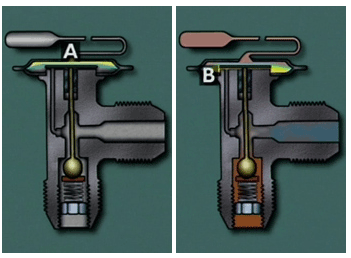Advantages of a Thermal Expansion Valve in Enclosure Cooling
 The thermal expansion valve is a throttling device that allows the refrigerant in an enclosure air conditioner to expand. A phase-changing refrigerant is circulated in the air conditioner through the compressor, condenser and evaporator. The expansion valve controls the flow of the liquid refrigerant into the evaporator where it gets converted into a gas upon absorbing the heat from the enclosed space. Older designs used a passive capillary tube to allow uniform expansion of the refrigerant, while modern air conditioners use an active thermal expansion valve that changes the rate of throttling of the refrigerant based on the heat load.
The thermal expansion valve is a throttling device that allows the refrigerant in an enclosure air conditioner to expand. A phase-changing refrigerant is circulated in the air conditioner through the compressor, condenser and evaporator. The expansion valve controls the flow of the liquid refrigerant into the evaporator where it gets converted into a gas upon absorbing the heat from the enclosed space. Older designs used a passive capillary tube to allow uniform expansion of the refrigerant, while modern air conditioners use an active thermal expansion valve that changes the rate of throttling of the refrigerant based on the heat load.
Advantages of a Thermal Expansion Valve
Adaptable Refrigerant Flow
The thermal expansion valve adjusts the refrigerant flow into the evaporator to suit the heat load in the enclosure. This allows for an immediate response to an increase or decrease in the heat dissipated by your electrical equipment. Any temperature fluctuations in the enclosure will be immediately addressed.
Keeps the Evaporator Active and in Optimal Performance
Thermal expansion valves allow the evaporator to be active during the cooling process. By constantly modulating the refrigerant flow for the adjusted superheat, the valve ensures that the evaporator performs optimally.
Higher Power Efficiency
The thermal expansion valve enables the enclosure air conditioner to operate at optimum capacity to handle the heat load. It has the ability to work at higher capacities for an increased heat load.
Eliminates Risk of Compressor Breakdown
Thermal expansion valves ensure complete vaporization of liquid refrigerant in the evaporator. This eliminates liquid slugging or the risk of liquid refrigerant particles reaching the compressor, which could be detrimental to its normal operation.
Handles Variation in Refrigerant Charge
The amount of refrigerant in the cooling loop is a critical parameter that could impact the performance of an enclosure air conditioner, especially if it has a passive expansion device like a capillary tube. Thermal expansion valves are more tolerant to variation in refrigerant charge; since they adapt the refrigerant flow to match the heat load.
Better Temperature Control
The ability of a thermal expansion valve to control the refrigerant flow helps in controlling the temperature of the enclosure in a much smaller range. Capillary tubes typically allow a constant flow of refrigerant that makes immediate response to changing heat loads difficult. Since thermal expansion valves are active devices, they can keep the enclosure temperature much closer to the set point temperature than passive devices do. They also have a lower time constant needed for achieving the desired temperature in case of a sudden increase in heat load.
Thermal Edge provides thermal expansion valves as a standard feature in their enclosure air conditioner designs. To learn more about how thermal expansion valves can help provide optimum cooling for your enclosure and reduce energy costs, speak with our expert team at Thermal Edge.

